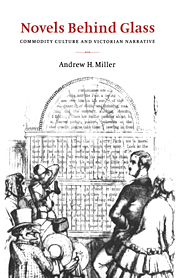Book contents
- Frontmatter
- Contents
- List of illustrations
- Acknowledgements
- Introduction
- 1 Longing for sleeve buttons
- 2 Spaces of exchange: interpreting the Great Exhibition of 1851
- 3 The fragments and small opportunities of Cranford
- 4 Rearranging the furniture of Our Mutual Friend
- 5 Owning up: possessive individualism in Trollope's Autobiography and The Eustace Diamonds
- 6 Middlemarch and the solicitudes of material culture
- Afterword
- Works cited
- Index
5 - Owning up: possessive individualism in Trollope's Autobiography and The Eustace Diamonds
Published online by Cambridge University Press: 17 August 2009
- Frontmatter
- Contents
- List of illustrations
- Acknowledgements
- Introduction
- 1 Longing for sleeve buttons
- 2 Spaces of exchange: interpreting the Great Exhibition of 1851
- 3 The fragments and small opportunities of Cranford
- 4 Rearranging the furniture of Our Mutual Friend
- 5 Owning up: possessive individualism in Trollope's Autobiography and The Eustace Diamonds
- 6 Middlemarch and the solicitudes of material culture
- Afterword
- Works cited
- Index
Summary
The images of Eugene Wrayburn perched within his imaginary lighthouse, of Dickens writing in his mirrored chalet, and of the pair of them together spinning tales in the Jolly Porters' “cosy” gave us, in the last chapter, emblems of the mid-Victorian male writer protected from the increasingly pervasive pressures of modern urban society, able in these enclaves to let his imagination play with some freedom. Moving from those images to the concerns of the present chapter immediately recalls Henry James' queasy admiration of Trollope aboard the Bothnia, producing his daily quota of work as steadily as if he had been at his desk in London, while his shipmates lurched to the privacy of their rooms. Trollope's careful maintenance of his famous accounting books, ruled into weeks at work and pages written, his precise calibration of words to a page and pages to an hour, his unembarrassed belief that sentences should be accommodated within the same rational economy as hours and shillings, all these habits appear to locate him firmly within a buffering Weberian scheme of bureaucratized subjectivity. Like that of a faithful employee assigned to the novel-producing division of the firm, Trollope's career demonstrates the enormously enabling energy provided by the routines of commodity production for those who enter into them and make them their own. All of the other Victorian novelists I am considering resisted the commodity form; Trollope seems to have embraced it and in it found his authority and a sheltering structure.
- Type
- Chapter
- Information
- Novels behind GlassCommodity Culture and Victorian Narrative, pp. 159 - 188Publisher: Cambridge University PressPrint publication year: 1995
- 1
- Cited by



